- Home
- Cormac McCarthy
Gardener's Son Page 2
Gardener's Son Read online
Page 2
MRS GREGG Please dont bother with anything, Mrs McEvoy.
Mrs McEvoy comes to the table, wiping her hands on her apron. She takes a chair. Silence.
Mr McEvoy enters the room. He smiles somewhat nervously.
MR MCEVOY We sure do appreciate this, Mrs Gregg. That boy . . . I dont know. He aint goin to be no easy patient.
MRS GREGG It’s going to be very difficult for him.
Mrs McEvoy looks at her in alarm.
MRS GREGG Dr Perceval is an excellent man. We must put our confidence and trust in him.
Mr McEvoy is standing in the doorway. He crosses his hands, holding them in front of him, and bows his head. Mrs McEvoy looks down.
MCEVOY (os) No, damn you! No!
Mrs McEvoy looks up in alarm. Mr McEvoy turns and looks back down the hall. Mrs Gregg rises. The doctor enters the kitchen. He is somewhat embarrassed, but determined. He smiles.
DR PERCEVAL I’m afraid he’s not taking it at all well. But there’s nothing for it. May I have a glass of water please.
MR MCEVOY Big sister, get the doctor a drink of water.
Martha crosses the kitchen to where the pail and dipper stand on the sideboard.
MR MCEVOY Might it not mend?
DR PERCEVAL I’m sorry, McEvoy.
MRS GREGG Is the operation unavoidable Doctor?
Dr Perceval takes the glass of water and drinks and lowers the glass and looks at Mrs Gregg.
DR PERCEVAL If he’s to live.
Mrs McEvoy begins to sob.
DR PERCEVAL Badly in sepsis, Madam. Badly.
MRS GREGG Yes.
MRS MCEVOY It might could mend.
DR PERCEVAL Mrs McEvoy, it could not mend. Not in this world. It is beset with rot. Who can say why? Germs have their flyways, like migratory fowl. Winging unseen through the night. The boy’s leg must come off if his life is to be saved. I’m sorry to be so blunt but you people will not seem to understand.
MRS GREGG And the boy? How will you . . .
DR PERCEVAL There’s nothing for it, I’m afraid. Once my man has administered the chloroform . . .
Mrs Gregg turns to Mr McEvoy.
MRS GREGG Where is he?
DR PERCEVAL Mrs Gregg, I dont think he’ll listen. He swore at me.
MRS GREGG He’ll not at me.
Mrs Gregg turns to Martha McEvoy.
MRS GREGG Take me to your brother’s room.
Martha leads Mrs Gregg along the hall. She opens the door. Mrs Gregg enters. The boy looks up at her from a small bed. He is pale and angry. She goes directly to the bed and sits down on it. She removes her hat, withdrawing the pins. She lays it by. She looks down at the boy.
MRS GREGG Robert.
She regards him. He does not answer.
MRS GREGG Robert, what Dr Perceval says is true. You must have the operation.
MCEVOY I’d rather to be dead.
MRS GREGG Life is a precious gift from God. No one has the right . . .
MCEVOY It’s up to him.
She looks at him. She does not understand what he means.
MCEVOY If God put the rot in it then let it rot off.
MRS GREGG You dont know what you say. Think of your parents. I lost a son in the war. I know what it is. I’d have wanted him back with no legs.
He does not answer.
MRS GREGG God does not ask that all the flowers in his garden be perfect. He has a special love for the ones . . .
She does not finish.
MCEVOY Ones are crippled.
Mrs Gregg looks up at him. She looks down the bed to the shape of his legs under the covers.
MRS GREGG Have you looked at it?
MCEVOY Looked at what?
MRS GREGG Your leg. Have you seen it?
MCEVOY No. I aint seen it. What do I want to see it for?
His answer is touched with a rising fear and suspicion.
MRS GREGG Let me see it.
MCEVOY No.
MRS GREGG Why not?
MCEVOY You caint see it. It’s in a cast.
MRS GREGG No it’s not. That’s a lie. Let me see it.
Robert McEvoy is very much afraid. He shakes his head rapidly from side to side. She takes hold of the bedlinen on the far side of the bed and pulls it back. He half raises up in the bed to stop her.
MCEVOY No.
She jerks away the covers. He struggles. Her hat is crushed. His legs lie revealed. The injured one is loosely swathed in bandage through which discolored stains have seeped and his whole lower leg and foot are perfectly black. She turns her head aside at the odor. He falls back sobbing. She recovers him and puts her hand to his face.
MRS GREGG I know it’s very hard. I know. I’ll stay with you.
The kitchen. The doctor and the family waiting. Mrs Gregg enters. The two men rise.
MRS GREGG Doctor Perceval, I think you may fetch in your assistant now.
DR PERCEVAL Thank you. Thank you very much. Did you want to be driven home?
MRS GREGG No. I’ll stay. I promised the boy.
The doctor starts for the door.
MRS GREGG Perhaps Martha would help you with your things. Would you like to help the doctor, Martha?
Martha shrinks. She shakes her head.
DR PERCEVAL Perfectly all right. Willis and I can manage.
MRS GREGG You dont anticipate any complications?
Dr Perceval pauses at the door and turns to look at her.
DR PERCEVAL We have every confidence of success, Mam. During the late war I removed over one thousand limbs. I was called in on the most difficult cases. . . .
Interior. Inside door of McEvoy’s room. The door opens and the doctor enters, leaving his assistant Willis framed in the doorway. The assistant is a huge and solemn black. They begin setting up their equipment, the black fitting the pump for the carbolic spray. Mrs Gregg comes to the door. The doctor and his man are donning butcher’s aprons. McEvoy turns his face to the wall. The doctor’s assistant approaches him with a bottle of chloroform and a pad. He dampens the pad and claps it over the boy’s mouth and nose. The boy struggles and flails. The doctor helps to hold him and after a while he is still. Mrs Gregg’s face is a curious expression of concern touched with a morbid curiosity. The doctor lays out his surgical instruments and they glitter in the lamplight as he places them in an enameled pan of dilute carbolic acid.
Interior. Martha McEvoy is standing in the kitchen door at the end of the hall. The door to McEvoy’s room opens and the black emerges and goes down the hall with the boy’s leg wrapped in a sheet under his arm. Mrs Gregg comes from the room and sees the girl standing there. They stare at each other.
Exterior. Day. A church bell tolling. Mrs Gregg in mourning is helped into her carriage by her son James and they set out behind the horsedrawn hearse up the dirt street through the middle of the town. The way is lined with townspeople. They pass the McEvoy house where McEvoy watches from a window. He looks pale and wasted and he watches the funeral with no expression at all.
Exterior. The Graniteville cemetery. The body of William Gregg lies in its casket beside a new dug grave. Flowers surround. People are taking their places and whispering and a large man in a black suit is standing by with his hands crossed at his waist waiting to begin. When all are settled he addresses the crowd:
SPEAKER Friends. Neighbors. We are gathered together here today at a most solemn and sad occasion. The man whose earthly remains lie here, and whose spirit we commend to a just God, has been a guiding force in the lives of nearly every one of us.
William Gregg was all his life an example of the virtue of hard work. He was himself born in indigent circumstances and was thrown upon his own resources at an early age. By force of his own character, by the habits of energy and industry and perseverance, he acquired for himself a fair share of the world’s wealth and some of its honors. But the crowning glory of his life and the true benefactors of his labors are here in the community which he established.
There are many among u
s today who can remember what life held in the way of promise before this man came among us. Too many of us were raised in hunger and poverty to ever forget. To see what he has wrought, the neat homes, the churches and schools, the gardens and the lovely grounds and last but not least the massive factory structure with its beautiful and perfect machinery, these things seem created almost by magic.
Mr Gregg was not the millionaire that common rumor made him. He was too good a citizen not to have lost heavily in the great disaster which has befallen our land. When a man works as he did for the common good the results of his labor will not be found in hoarded wealth, but in that increased prosperity and usefulness of those among whom he lived, which shall continue to bear fruit for generations after the first laborer himself has passed away.
Exterior. Dawn. The town, row of houses coming to life, lamps being lit, the windows projected onto the near dark in yellow squares, roosters crowing. A dog yaps. Doors open and shut. People’s voices. The mill bell tolls. People are moving through the streets. Young girls, small children.
Interior. The mill. A man goes along the aisles of machinery lighting lamps with a long torch. The great wheel that turns the spindles stirs sluggishly, the belts slither and turn, the overhead shafts begin to revolve, the spindles turn. Young girls and children are taking their place at their machines. Close up of Martha McEvoy. Two young boys roughhouse at their tasks. McEvoy comes down the long row through pools of lamplight and enters the office door at the end of the mill. He has a crude crutch but he moves with grace and agility. He shuts the door and goes through into the office of the timekeeper who sits at his desk with a green eyeshade and gaitered sleeves and sorts papers and sips coffee from a huge porcelain mug. When he sees McEvoy he swivels about in his chair and regards him. McEvoy leans on his crutch and looks at the timekeeper with a sort of disinterested malignity, something other than disdain.
TIMEKEEPER Well I reckon you’re the boy.
Robert McEvoy doesnt answer.
TIMEKEEPER McEvoy. That it? McEvoy?
ROBERT That’s it.
The timekeeper raises an eyebrow.
TIMEKEEPER That’s it?
McEvoy doesnt answer.
TIMEKEEPER Did they not learn you to sir at your home?
ROBERT Sir.
TIMEKEEPER If Mr Gregg was to hear that he’d flop in his grave like a fish, God rest his soul. Good manners are never out of place. What he used to say. Well. Tell you what. You can start in by cleanin this here place up some. Right yonder through that door and on the right is a closet and you’ll find a broom in it if I’m not bad mistaken. We’d best get the heaviest dirt out fore cotton starts to volunteer in here.
He starts to turn back to his desk, then turns and looks at the boy again.
TIMEKEEPER Can you . . . I mean, you can manage a broom all right caint ye? I never thought about . . .
ROBERT I can do anything anybody else can.
The timekeeper watches him swing through and out the door.
Interior. James Gregg’s office. He looks up to see the new office boy go past his door. After a while he rises and goes out to the outer office. There is a confrontation taking place between the timekeeper and a ragged man at the door.
TIMEKEEPER I dont care what they told you. We are not takin on any hands.
RAGGED MAN Well they done paid our fare down here on the train to go to work.
TIMEKEEPER Your friends and neighbors did. Took up a contribution.
RAGGED MAN Yessir.
TIMEKEEPER They wont get up no purse to get you back though, will they?
RAGGED MAN I dont know.
TIMEKEEPER Well I do.
RAGGED MAN We never allowed we’d be goin back. They said we could come down here and go to work—put the youngerns to work. And the girls. Said we’d get a sealed house and a garden patch.
JAMES GREGG How many of you are there?
RAGGED MAN Well now, there’s at least eighteen hands. They aint but two of them youngerns under twelve year old. Some of them is slight for they age but I guarantee em to turn in a day’s work.
JAMES GREGG How many fares?
RAGGED MAN Fares?
JAMES GREGG We’ll need to know how many half fares and how many whole.
RAGGED MAN We was paid our fares come down here.
JAMES GREGG How many all together?
RAGGED MAN They was twenty-six of us come down.
TIMEKEEPER In one family?
RAGGED MAN Lord God no, not in no one family. They aint but five in my family. They’s three families of us. Some of us is cross kin.
James Gregg goes past the man to the door and looks out. Standing along the edge of the road are a band of filthy and ragged people with bales of bedding and sorry household effects, nearly all barefooted, some appearing to be albinos, a couple of emaciated hound dogs, a few crates of chickens. They are staring hungrily toward the office.
JAMES GREGG Mr Giles.
TIMEKEEPER Yessir.
JAMES GREGG Find out how many fares are here and make arrangements for their tickets back to wherever the hell they came from.
TIMEKEEPER It’s a damned outrage, Cap’n Gregg.
JAMES GREGG Well what would you do with them?
TIMEKEEPER I know. But it’s still a damned outrage.
JAMES GREGG Send up to the church and see if they can find them some dinner.
RAGGED MAN We aint even had no breakfast.
JAMES GREGG And get them out of here on the afternoon train.
McEvoy is sweeping the floor behind them. He has left his crutch and he alternately leans on the broom to hop forward and sweep with the broom while standing on one leg.
RAGGED MAN Cap’n you sure you aint got no place for us? We come a long way to be turned back. I mean, they showed us a dodger, said to come on.
JAMES GREGG The last bill we put out was four years ago. Mr Giles.
TIMEKEEPER Mrs Cornish will go crazy when she sees this lot. She said the last time she wouldnt put up with it no more.
JAMES GREGG That’s what she said the time before. Tell her some of God’s seed has fallen on barren ground.
TIMEKEEPER Let’s go.
The timekeeper and the ragged man go out. James Gregg watches them, then shakes his head and turns and goes back into his office past McEvoy, not looking at him. McEvoy sweeps to the door and stands leaning on the broom watching the procession of derelicts wend up the road.
Evening. Exterior of factory. Factory bell tolls the end of the day. The sound of the machinery grinds to a halt and some workers appear at the door.
Interior. The office. Martha McEvoy enters and looks about the office for Bobby. She looks into James Gregg’s office and he looks up from his desk and sees her.
JAMES GREGG Can I help you?
Martha turns. She is somewhat flustered.
MARTHA I was a huntin my brother.
JAMES GREGG Your brother?
MARTHA Yessir.
JAMES GREGG Well come in. I mean, I dont have him, but we can talk about it.
MARTHA Well, if he aint here . . .
JAMES GREGG Come on in. I wont bite. At least not hard.
Martha comes into the office. She stands nervously on the far side of the desk.
JAMES GREGG Where do they keep you hid at? I dont believe I’ve seen you before.
MARTHA I just work in the spinnin room.
JAMES GREGG And what is your name?
MARTHA Martha.
JAMES GREGG Well Martha, you a . . . How old are you?
MARTHA Fourteen.
JAMES GREGG Fourteen. You got a boyfriend?
MARTHA No sir.
JAMES GREGG Dont have a boyfriend?
MARTHA No sir.
JAMES GREGG Well I dont know why not.
Martha is nervous, but she gives a sort of toss of her head to clear her hair from her face. James Gregg smiles.
JAMES GREGG Maybe you’re just too feisty for these young boys.
MARTHA
I aint feisty.
JAMES GREGG Well now I dont know. I bet you’d be just a handful.
MARTHA A handful of what?
Gregg half chuckles to himself.
JAMES GREGG Well now I’d be afraid to say.
Martha looks down in embarrassment. James watches her.
JAMES GREGG You dont smoke cigars do you?
Martha looks up.
MARTHA Do what?
JAMES GREGG Smoke cigars. You a cigar smoker?
She looks confused, until she sees a trace of a smile at his mouth. She smiles. He has taken a cigar from his vest pocket.
MARTHA No.
JAMES GREGG Ah.
MARTHA (quickly) But I’ll take one to my daddy if you’re passin em out.
James Gregg raises one eyebrow and nods in a sort of congratulatory way, somewhat surprised.
JAMES GREGG Well.
He rises from his chair and holds forth the cigar. She must come forward to take it and she does so. She takes the cigar. He watches her.
JAMES GREGG Yes, Miss Martha, I’d say you would be a handful.
MARTHA I dont know nothin about that.
JAMES GREGG Dont know nothin about that.
MARTHA No.
JAMES GREGG Well, I’ll tell you what.
He takes from his pocket several coins and selects a ten dollar gold piece. She watches him.
JAMES GREGG Tell you what, Martha. I bet you do know something.
He drops the ten dollar piece on the desk between them. She looks down at the coin.
JAMES GREGG Would you like to have that?
Martha looks at the coin on the desk. James looks at her. She looks at the coin and the full implication of the money strikes her and she looks at James Gregg with an expression partly of disdain but mostly she is just afraid. When he sees this he almost reaches to take back the coin, almost rises from his chair, but she has turned and fled from the office.

 The Road
The Road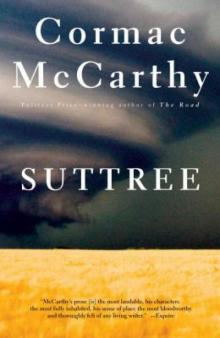 Suttree
Suttree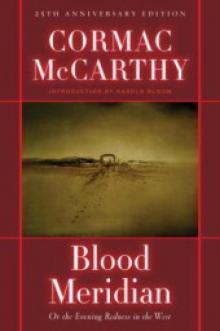 Blood Meridian, or the Evening Redness in the West
Blood Meridian, or the Evening Redness in the West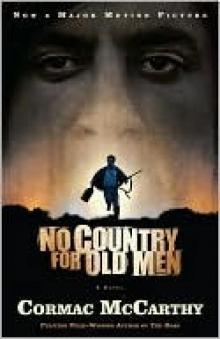 No Country for Old Men
No Country for Old Men The Sunset Limited
The Sunset Limited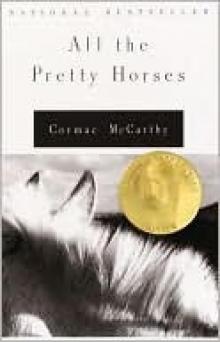 All the Pretty Horses
All the Pretty Horses The Crossing
The Crossing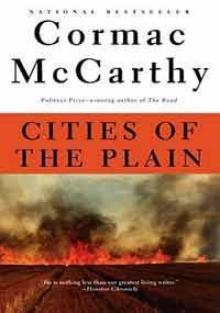 Cities of the Plain
Cities of the Plain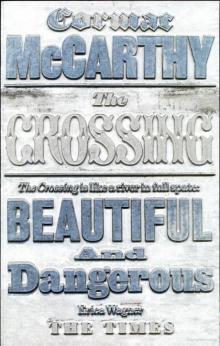 The Crossing tbt-2
The Crossing tbt-2 Gardener's Son
Gardener's Son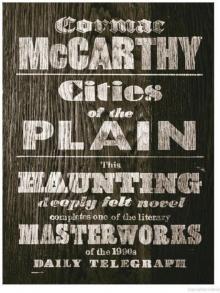 Cities of the Plain tbt-3
Cities of the Plain tbt-3 The Stonemason
The Stonemason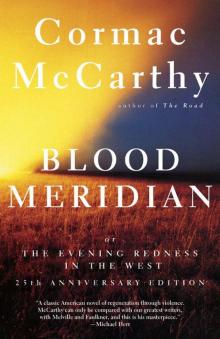 Blood Meridian: Or the Evening Redness in the West (Vintage International)
Blood Meridian: Or the Evening Redness in the West (Vintage International) The Sunset Limited: A Novel in Dramatic Form
The Sunset Limited: A Novel in Dramatic Form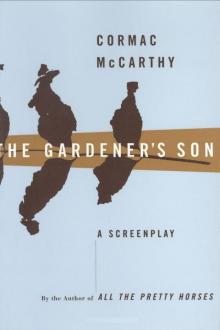 The Gardener's Son
The Gardener's Son